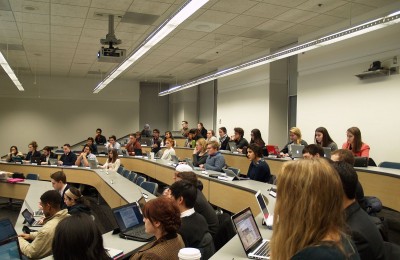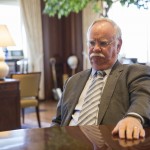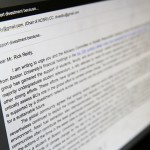
Boston University Student Government Senate gathered Monday night to consider the possibility of adding a fossil fuel divestment referendum on the ballot during the upcoming student body election.
Claire Richer and Rachel Eckles, president and vice president of Students for a Just and Stable Future, proposed two different wordings for the fossil fuel divestment referendums following the a request from SJSF during the first Senate meeting on Feb. 1 to hold a referendum to poll student opinion.
“Currently, Boston University’s endowment supports the fossil fuel industry. The Board of Trustees has stated that Boston University should divest (stop investing) in an industry when it causes a ‘degree of social harm’ that is ‘clearly unacceptable,’” stated one of the potential wordings of the proposed referendum shown on Powerpoint. “Under this standard, do you believe BU should divest from the fossil fuel industry given that it drives the climate crisis?”
Another possible wording of the ballot question changes “under this standard” to “under this high standard” and “climate crisis” to “climate change,” stated wordings on the presentation slides.
Richer, a senior in the College of Arts and Sciences, said even though there are no formal laws in the SG Constitution about a referendum, SG has sent out a referendum before, The Daily Free Press reported in an article on March 23, 1993.
“There was a referendum actually to approve funding for a rape crisis center,” Richer said in her presentation. “The Student Committee on Medical School Affairs’ constitutions also currently includes laws on referendum.”
Richer said SJSF has been campaigning this issue for three years now, and a referendum will allow them to see how students feel about the issue.
Avi Levy, chairman of the rules committee and a senior in CAS, proposed a motion to vote on whether the fossil fuel issue can go on the ballot at all, while postponing further discussions about the wording of the proposal. The motion passed with 23 votes in support, seven against and two abstentions.
Several senators took issue with the use of “high standards” and “contribution to climate change” in the proposed second wording of the referendum.
Eckles, a sophomore in CAS, addressed the critique, saying that the use of “high standards” is to emphasize that fossil fuel divestment is a “big stance for universities to make” and connected divestment to climate change to underline its severity.
“We try to make the wording as unbiased as possible,” she said.
Levy proposed a second motion to have a temporary committee to focus on the wording of the referendum. The motion received an informal pass with 19 in support, seven against and two abstentions.
SG President Joe Ferme said the wording will focus on objectivity and should be ready by the next Senate meeting, set for March 2.
“Hopefully the committee will meet as often as it takes to get some wording down,” said Ferme, a senior in CAS. “We really came to the conclusion that putting a referendum on the ballot is a good idea.”
Executive board members also used the meeting to update on further campaign progresses. Robbie Brussell, SG’s director of communication and leader of the Expect More Campaign, spoke about a goal to increase student sign-ups for the campaign from 200 to 1000. Will Horne, SG vice president of finance and leader of the 16,000 Strong Campaign, told Senate about plans to present to different student groups and order marketing materials.
“We’re moving along really well,” said Horne, a sophomore in SMG. “We plan to reach out to other big student groups and RHA.”
Several senators said shared mixed about proceeding with the fossil fuels referendum.
Mel Finau, a Danielson Hall RHA senator, said she voted in support of putting the referendum on the school-wide ballot because of the gravity of the issue at hand.
“It should be on [the ballot] because this involves a quality of life issue, and this is definitely a big issue,” said Finau, a sophomore in CAS. “It’s important that we really advocate for the students and because we, as a student government, have trouble getting out to students already. I felt that having a referendum on the ballot would be a good way to actually go and speak and hear what the students have to say.”
Rachel Feigelson, a West Campus senator, said though it is an important issue, putting fossil fuel divestment on the ballot is not the best way to go about getting student input.
“It should be talked about in a different way, not on the ballot,” said Feigelson, a freshman in the College of General Studies. “It’d be great if it was done on a separate survey and we really get everyone’s opinion that way, but on the ballot, I don’t think it’s the best idea. If this is on the ballot, people might be sidetracked. Politics is obviously a pretty important issue, but it shouldn’t be intertwined with school issues.”




